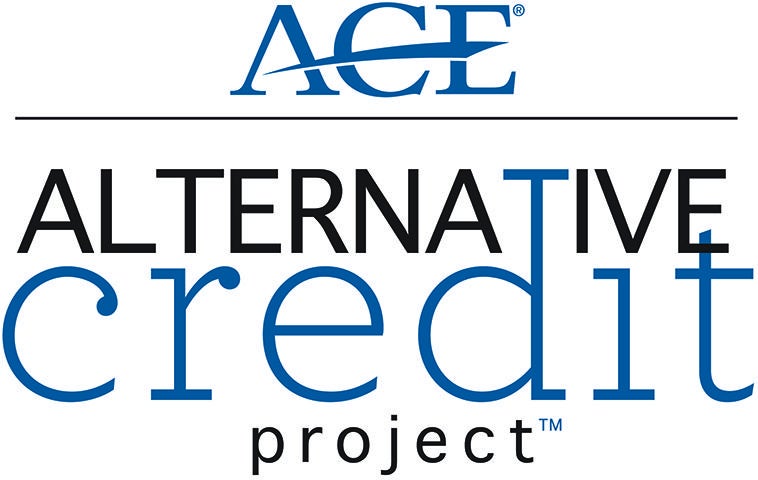Overview

Since 1918, the American Council on Education (ACE) has provided leadership and a unified voice on key higher education issues. Through research and innovative programs, ACE represents the interests of more than 1,800 campus executives, as well as the leaders of higher education, related associations and organizations. Together, ACE member institutions serve 80% of current college students.
ACE is engaging an Alternative Credit ProjectTM to encourage greater acceptance of students’ alternative credit and to create a more flexible pathway toward postsecondary education attainment for more than 31 million non-traditional students who may have some college credit but no degree.
The Alternative Credit ProjectTM aims to help students for whom the traditional higher education framework is not a feasible option, due to lifestyle concerns, financial restrictions, or time constraints, as well as for students returning to school after an extended period away from the classroom.
ACE Faculty Reviewers
ACE recruits faculty reviewers from postsecondary institutions across the country. Faculty reviewers are individuals who are currently teaching at a postsecondary institution recognized by the Council for Higher Education Accreditation (CHEA) and have been teaching for a minimum of five years. ACE carefully selects a group of faculty with appropriate subject matter expertise from a group of institutions to serve as faculty reviewers. This process ensures the incorporation of standards and best practices found in two- and four-year public and private colleges and universities.
Alternative Credit Project Course Quality Assessment Rubric
The review team evaluates the organization’s course materials to determine whether the quality, content, scope, rigor, and assessments align with the same standards being applied to the current curriculum taught at accredited postsecondary institutions. The decision of whether or not to grant ACE credit recommendation for a course, faculty reviewers consider relevant factors broken down into five domains:
- Online Learner Support & Resources
- Online Organization & Design
- Instructional Design & Delivery
- Student Learning Outcomes, Assessment & Evaluation
- Teaching with Technology
For each course, the faculty reviewers examine relevant material provided, which includes, but is not limited to, instructor and student materials, as well as assessments. Each course is reviewed by at least two faculty reviewers using a consensus-based approach as to whether a credit recommendation will be made. When a credit recommendation is made, the faculty reviewers include these two key points:
- The formulation of a credit hour recommendation for each course, such as course equivalence to one, two, or three credit hours.
- The assignment of a subject area for which the course may be transcripted by the receiving institution.
Important: You may request your ACP transcript directly from the American Council on Education (ACE).